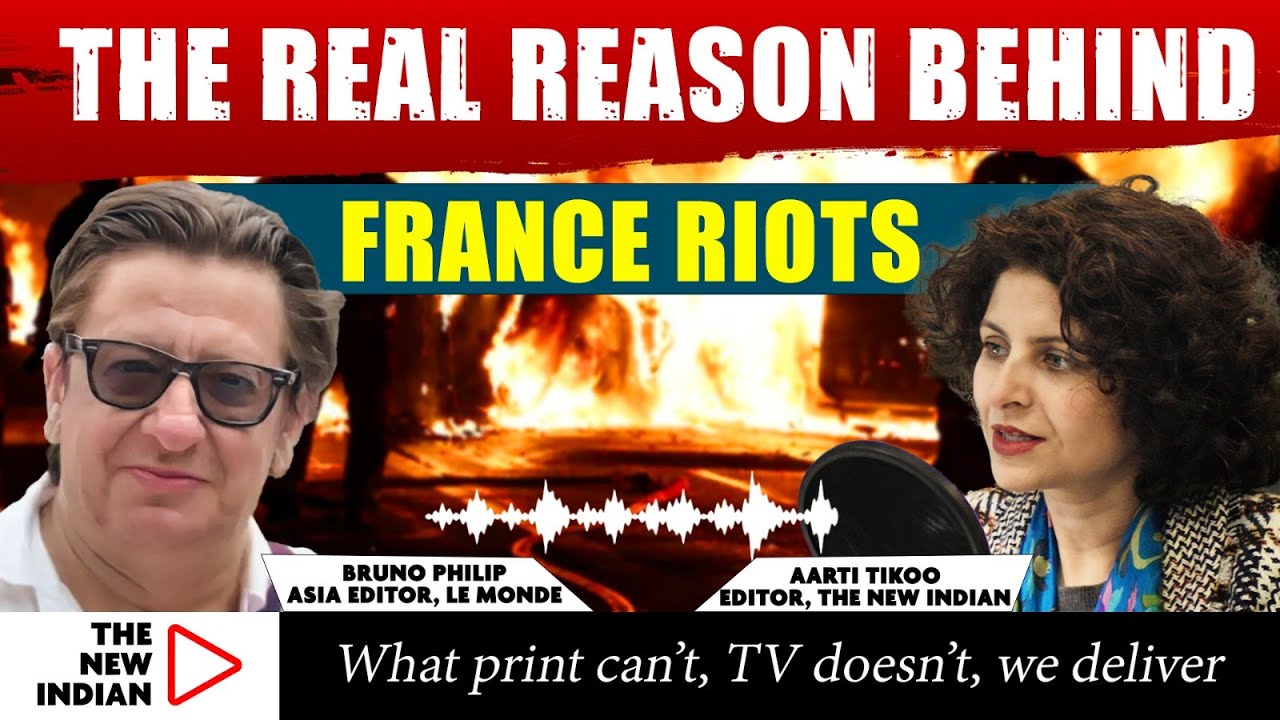PARIS: A conversation between Aarti Tikoo, The New Indian Editor-in-Chief, and Bruno Philip, Le Monde Asia Editor, reveals concerns over France’s situation following the riots in several parts of the European country. They delve into the challenges faced by immigrant communities and the impact of government policies.
Excerpts from the interview
Aarti Tikoo: We have Mr. Bruno Philip with us, Le Monde Asia Editor, to shed light on the situation in France. Bruno, can you explain what is happening in France and the underlying reasons behind it?
Bruno Philip: Well, what’s happening in France is the result of many causes, many reasons. It’s a complex situation with various factors at play. There are historical, political, and sociological elements contributing to the current state of affairs. Religion also has some influence, although it is not the primary factor. Overall, it is a combination of these factors that has led us to this point.
Aarti Tikoo: Could you elaborate on some of these reasons and how they have shaped the current situation in France?
Bruno Philip: Certainly. One significant factor is the post-colonial nature of France. Many people from Northern Africa and West Africa immigrated to France in the 1960s to work. However, they were never fully assimilated into French society. Instead, they settled in poor suburbs, leading to a sense of alienation and segregation. These suburbs, over time, became increasingly marginalized and developed a reputation as ghettos.
The policies of successive governments aimed to improve the situation and promote assimilation. However, it takes time to address deep-rooted issues and bridge the gap between different communities. Despite efforts to allocate a significant budget for improvements, it is a gradual process, and the impact may not be immediate.
Aarti Tikoo: Why is the situation in France seemingly worse compared to other European countries facing similar challenges?
Bruno Philip: That’s a question I often ask myself. The root causes in other European countries are similar to some extent. The presence of immigrant communities and the struggle for integration can be observed in countries like Germany, England, Denmark, and others. However, the intensity and level of violence seem to be more pronounced in France.
While racism and discrimination exist in all societies, there is something unique about the situation in France. It may not be accurate to label the French as more racist than their European counterparts. However, the level of violence and animosity towards the French society, including the police, appears to be higher. This sentiment of not belonging and a lack of respect is concerning.
Aarti Tikoo: What impact do you think these recent events will have on the French government and society?
Bruno Philip: These events are likely to have a significant impact on both the government and society. In terms of politics, the next elections in France are still a few years away, but the current situation could influence the political landscape. I believe the recent violence will impact the next election. Mainstream French citizens, including shopkeepers and the middle class, feel threatened by the situation. It’s unprecedented and will shape how the government addresses immigration. Immigration policies across Europe will likely be tightened. I’ve lived abroad for years, and I don’t understand why the situation in France is worse compared to other European countries facing similar challenges. While elections aren’t imminent, we’ve seen far-right parties gaining influence in countries like Finland, Denmark, and Sweden. It’s a complex situation, but France seems to be experiencing more difficulties than its counterparts, even with a diverse population in countries like the UK.
In terms of society, there will likely be a reevaluation of the government’s approach to immigration and integration. The policies will likely undergo review and may result in a tougher stance on immigration, not just in France but across Europe. It is a trend we have observed in various European countries where far-right parties have gained political influence.
Aarti Tikoo: As a journalist with vast experience, why do you think France is experiencing these challenges to a greater extent?
Bruno Philip: As someone who has lived abroad for many years and returned to France recently, I find myself pondering the same question. While the underlying causes are similar in various countries, the level of violence and animosity in France is distinctive. The reasons behind this disparity remain elusive.
While it’s true that history, society, economy, and ghettos contribute to the situation, the specific factors leading to heightened violence and unrest in France are not yet fully understood. It is a complex issue that requires deeper analysis and understanding.
Aarti Tikoo: What steps do you believe should be taken to address these challenges and improve the situation in France?
Bruno Philip: Addressing these challenges requires a comprehensive and multi-faceted approach. It involves fostering a sense of belonging and inclusion among all communities. Efforts should be made to bridge the gaps between different ethnic and cultural groups and promote social cohesion. Additionally, policies must focus on creating equal opportunities and providing necessary resources for marginalized communities.
Education plays a crucial role in fostering understanding, empathy, and acceptance. By promoting cultural exchange and dialogue, we can break down barriers and foster a more inclusive society. It is also essential to tackle economic disparities and invest in the development of disadvantaged areas.
Ultimately, improving the situation in France requires a long-term commitment from the government, society, and individuals alike. It is a collective effort that must prioritize unity, integration, and equal opportunities for all.









